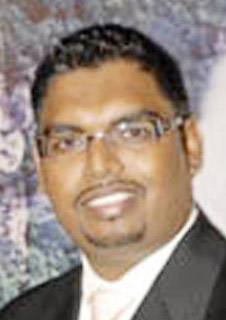Acting Tourism Minister Irfaan Ali says the Marriott Hotel and an expanded Cheddi Jagan International Airport are crucial if Guyana is to build on the tourism sector.
Ali, substantive Housing and Water Minister, was making his contribution to the debate on the $192.8B National Budget in the National Assembly yesterday.

“There is a lot of talk about the $75.8 billion investment that is directly related to the expansion of the tourism sector and that Mr. Speaker is the development of the new airport and the Marriott Hotel and the Amaila Falls Hydro project, which would see opportunities to invest [because of reduced cost],” he said.
Opposition members and other commentators have lambasted government for their handling of information regarding these projects, which have been described as shrouded in secrecy. The recent release of some documentation has not dispelled suspicions about the projects.
“Once the Marriott Hotel comes to Guyana, it would give Guyana free marketing time, because there is what you call the Marriott Magazine. Guyana will then be featured in that magazine. With the airport, it would allow us to become a regional hub for refuelling,” Ali said.
He said that as a result of the investment in the hydro project, there will be reduced energy cost, which is necessary to improve Guyana’s competitiveness. “We will attract investors to the manufacturing sector and this is why such investment is critical to the advancement of our country,” he explained.
Commenting on criticisms of VAT, Ali said that VAT only accounts for 27.6 of tax revenue. He said that the consumption tax, which VAT replaced, represented 40 percent of the tax revenue. “In fact, Mr. Speaker, the percentage share of VAT on total revenue has decreased from 32 percent to 26 percent. These are the facts,” he said, calling VAT merely a more efficient tax.
He said that the tax revenue increases represent a broadening of the tax net and not a burden on the taxpayer.
With regards to the increases in old age pensions, he said that the government is still not satisfied with that which has been announced. “But we must balance political ambition with prudence,” he said, adding that because of longevity, there are more pensioners around now than was the case when the PPP/C took office in 1992.
Ali said that all of the major sectors of the economy in 2011 benefited from higher loans from the commercial banks, indicating that the local economy was healthy and that growth was taking place.
He said that interest rates also trended downwards over the last five years, stating that the average lending rate declined from 13.2 percent in 2006 to 11.68 percent at the end of 2011.
“Mortgage rates declined to 4.2 percent at the end of 2011. The banking system is extremely sound, ranking 53 out of 153 countries in 2010. According to the Global Economic Forum, the Capital Adequacy Ratio of licenced depository institutions was well above the established international benchmarks. Further, the ratio of non-performing loans have trended downwards from 2006 to 2010,” he said. “Mr. Speaker, this has a lot to do with the strong regulatory framework that the government has put in place.
These benefits are as a result of government’s commitment to modernising the financial sector,” he said, adding that as a result of the performance, persons are now able to access mortgages at low interest rates.
According to Ali, based on the result of government programmes over the last six years, there should be no reason for changing course at this juncture in Guyana’s history. “Instead we should continue to pursue the programmes and policies as set out in the 2012 budget in order to achieve our national priorities,” he said.
The budget, he added, intends to create jobs for the people of Guyana, provide housing and shelter for all, especially the poor and vulnerable, and cater for the transformation of the economic base to make the economy more resilient to external shocks. He said that the budget aims also to improve the human capital, ensure better quality of social services, strengthen national institutions responsible for safety, security and justice, promote positive and stable economic growth, create a friendly business environment to encourage local and foreign investment and maintain fiscal prudence, ensuring equitable distribution of the country’s wealth and the protection of the environment.
With regard to job creation, he said that in the ICT sector $2.6 billion will be invested to lay high speed cables. He said that this is linked to the policy priority of government; the technological advancement of the economy and to give every Guyanese person the opportunity for learning ICT.
“More than 3,000 new jobs have already been created from investment thus far. Additional investment will create 6,000 jobs in the near term and 15,000 new jobs in the medium term. More persons will have access to the internet. [There will be] new methods of educating, reaching all Guyanese in every corner of the country. 90,000 persons will benefit from having a laptop. We are going to achieve what even the developed world is fighting after and that is to have a 100 percent IT literacy in Guyana,” he said.
Ali said that the national priority is for the protection of the traditional sectors and the expansion of the economic base. “Private investment from Bosai will see US$100 million [invested]; BCGI, US$80 million; First Bauxite Inc., US$120 million; Guyana Goldfields, US$600 million; ETK Inc, Sandspring Resources US$800 million. These are the private investments that will be flowing through the economy as a result of budget 2012,” he argued. He added that the impact of this will be the creation of some 3,400 jobs.




